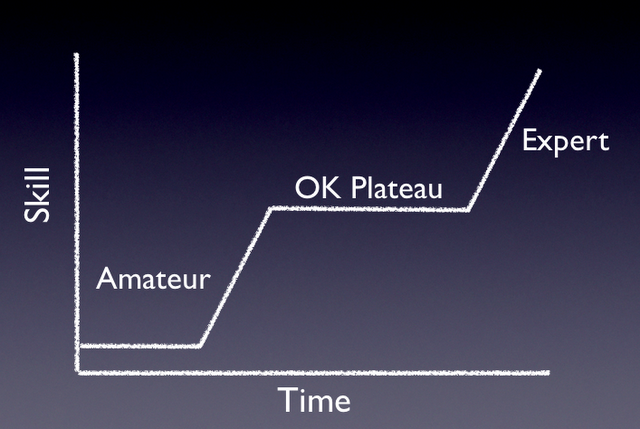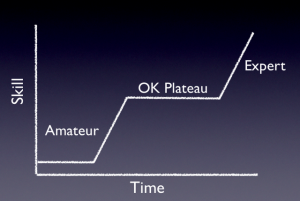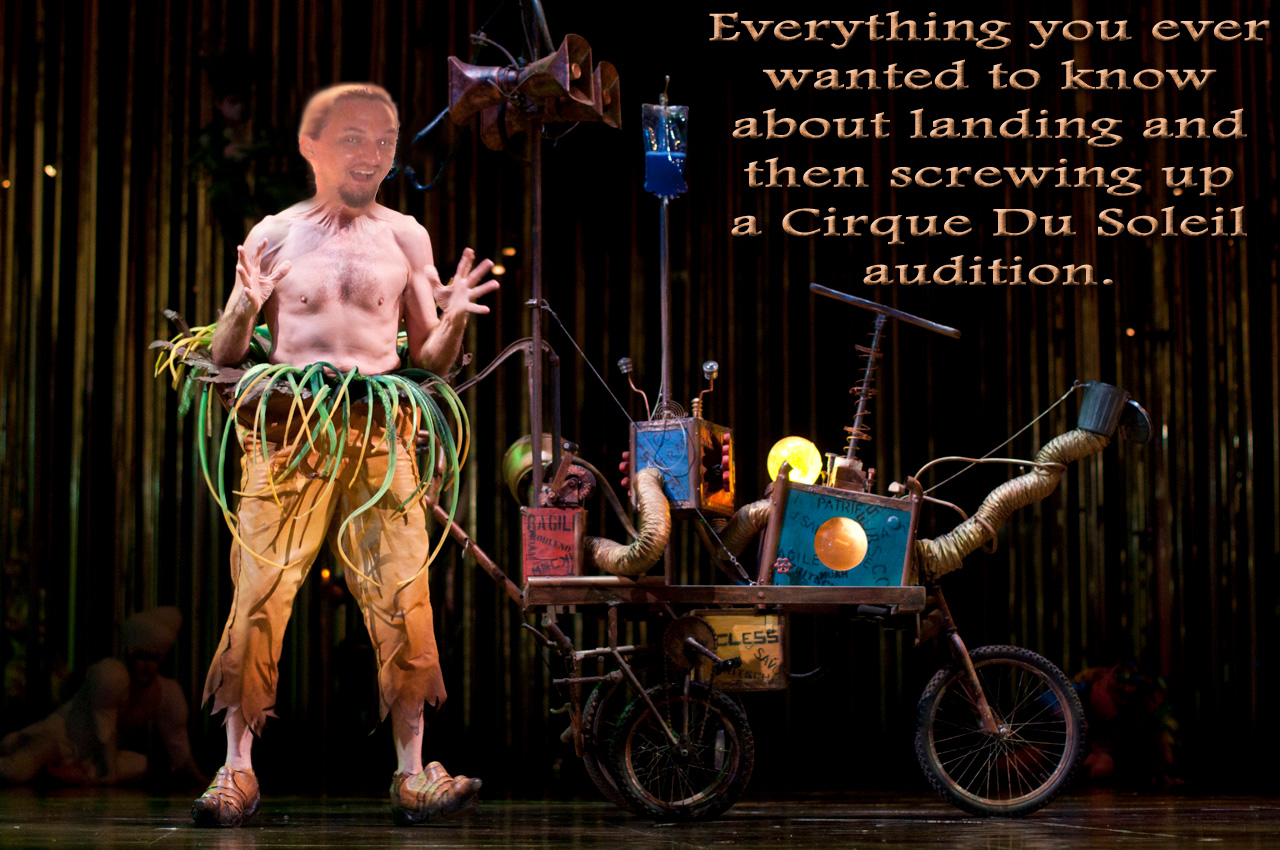It doesn’t matter if you’re an athlete, a writer, a musician, or a juggler, there comes a time in skill development that you reach what’s called the “OK Plateau.” This is when you get to a point where you’re content at what you can do and then plane out with going further. Some skilled people can stay at this plateau forever. But how do you move past this point to attain the status of an “expert”?
I recently read a book called Moonwalking with Einstein by Joshua Foer that covers a variety of topics, including the “OK Plateau.” The book is mainly about how to maximize your memory power, a quality that any skilled individual should aspire to improve upon.
On a personal note–full disclosure–I think I hit my own OK Plateau from about 2004 till about 2012. And that’s a big chunk of time. Why so long? I honestly thought I knew everything there was to know about playing the bass guitar. If I saw any bass player doing something amazing I just chalked it up to them being better than me at a particular skill. How wrong I was. I honestly got to a point in my playing where I didn’t see how to improve myself or what I could do to move past my plateau. What else was there to practice? What else was there to learn?
And listen, you can be an amazing player and still be at the OK Plateau. Just like you can be a shitty player and be stuck at an OK Plateau. It doesn’t matter where you’re at in your development, it’s all about that level of time when you’ve just planed out and accepted your skills for where they’re at. Rest assured, no matter how badass you think you are, there is always going to be someone around the corner that can smoke you at something.
I knew I was at a plateau in my playing. I thought I knew all the fancy tricks but I just had to work at sharpening them. It was when I was on my first tour in 2012 that I learned how wrong I was. It started when the idea came to me that I wanted to find out why players such as Victor Wooten and Steve Bailey were regarded as great. What made them so great? What was it about their playing that got them so many gigs and magazine features? This came at a time when I was trying to play every show perfectly. I had these moments in songs where I would have these brain farts and forgot what came next. I hate that. So I was trying to find out how to better remember songs as well as find out what made iconic bass players separate from other bass players.
“What separates experts from the rest of us is that they tend to engage in a very directed, highly focused routine,” Foer says. This is called “deliberate practice.”
What Foer is saying is that there is a difference between learning a scale or an exercise then mindlessly practicing it over and over in front of the TV. “[experts] develop strategies for consciously keeping out of the autonomous stage while they practice by doing three things: focusing on their technique, staying goal-oriented, and getting constant and immediate feedback on their performance. In other words, they force themselves to stay in the ‘cognitive phase.’ ”
Foer goes on to say, “[amateur] musicians, for example, are more likely to spend their practice time playing music, whereas pros are more likely to work through tedious exercises or focus on specific difficult parts of pieces.”
Right there is a key tip. Are you sitting at home strumming away at your favorite tune? If you’re happy doing this then have at it. But if you want to be a serious, in-demand musician you need to actually sit down, have a goal, and consciously work on fine-tuning your playing in certain areas.
“When you want to get good at something, how you spend your time practicing is far more important that the amount of time you spend.”
Another key tip there by Foer. I hear many musicians talk about how they practice for “ten hours” a day…”12 hours a day” and so on. Really? Do ya? Or do you hold the guitar in your hand while watching Animaniacs, noodling around while binge watching for 9 hours. That’s not focused practice. Focused attention and strategic time placed in practicing is far more than how long you can hold you guitar on your lap.
“The secret to improving a skill is to retain some degree of conscious control over it while practicing–to force oneself to stay out of autopilot.”
This doesn’t just go for musicians. Of course it doesn’t. Come on, folks. This can be applied to playing tennis, video games, swimming, skeet shooting, etc. etc.
Ok, so how I broke past my plateau.
I was stuck at a place where I knew how to do advanced tapping, I could play fast, and I could slap and pop. So what else was there to know? I wanted to improve but didn’t know how. I resolved to find as many instructional videos online that I could. So I went to YouTube and I saw this video by Victor Wooten and Steve Bailey.
From this video I discovered that there was this thing called the “double thump” and something called “harp harmonics.” Wow! I had never heard of that stuff before. Those two things alone sent me down a coarse to master those two techniques. It’s two skills I’m still working on. After learning everything in that video I was able to develop my own video where I heavily utilized the double-thump as well as implemented the harp harmonic trick (among other things) into my solos.
Then I started getting into instructional videos by Michael Manring, Troy Tipton, TM Stevens, Bill Dickens, Billy Sheehan, and on and on.
I would either go down to the local music store and buy the DVDs or, if they weren’t available, I would just learn from YouTube. If you want to go the YouTube route I would highly suggest that you download this tool called the YTD downloader. Basically, this will allow you to download any YouTube video and convert them to play on your TV. That way you can learn from these videos from wherever you practice. You can get the YTD downloader here:
http://download.cnet.com/YTD-Video-Downloader/3000-2071_4-10647340.html?tag=main;pop
So have at it, folks. Don’t plane out and rest in the OK Plateau. There are ways to move ahead.




